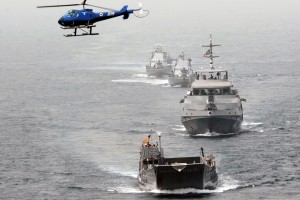AFRICOM’s new “think tank,” the Social Science Research Center (no relation to the 90 year old Social Science Research Council based in New York) recently published a study on “Civilian and Enlisted Perspectives on the Armed Forces of Liberia.” The report comes at an important time. Not only is the U.S. military taking over direct responsibility for training Liberian troops from private contractors such as DynCorp, but trust in most political institutions remains low in Liberia. Research began with 35 informal meetings. Then based on interviews with 19 civilians and two focus groups, the study concludes that reform efforts present Liberia’s armed forces with an opportunity to broaden its involvement in humanitarian activities, and that Liberians view U.S. support for reconstruction as “essential.” The study’s author recently gave a compelling summary of the findings at the African Studies Association 2010 Annual Meeting in San Francisco.
As a matter of background, Liberia’s 2003 Comprehensive Peace Agreement (CPA) tasked the United States with playing a “lead role” in security sector reform. A survey of Americans by the Program on International Policy Attitudes at the time found strong support for intervention in Liberia. (It also hauntingly noted that support for intervention eroded quickly when respondents weighed such involvement under two conditions: a declining security situation in Liberia, and expanding American commitments to Iraq.) Within Liberia, a December 2008 Afrobaromter survey found that U.S. involvement has generated goodwill among Liberians, with two thirds of them saying that the U.S. has helped Liberia “a lot” since the war.
Community Relations and Humanitarian Missions for the Liberian Military?
An important question is whether the U.S. is now pulling the Liberian Army in uncertain, new directions: the SRRC report states that civilians and soldiers want the Armed Forces of Liberia “to support humanitarian and community outreach efforts” during peacetime. The study offers some limited evidence to support for this view, but since such missions are at the core of AFRICOM’s most controversial functions, support would be better documented through a more representative sample – and certainly in a country less supportive of the Command. (Liberia was the only African country that offered to host the command when it was announced in 2007).) One should therefore be cautious about generalizing the findings of this study to Nigeria or most African countries, for that matter. The study also concludes by saying that military reform in Liberia presents an opportunity for new missions, and that AFRICOM should use its interagency structure to influence “good governance, constitutional reform, infrastructure development, economic recovery and poverty alleviation.”
According to Lou Goodman and Johanna Mendelson, research on the U.S. Southern Command suggests that such ideas should raise warning flags. They conclude in “The Threat of New Missions: Latin American Militaries and the Drug War” that once the military believes in its non-military competence, it begins down a slippery slope that erodes civilian control of the military. (See also: Civil-Military Relations and Democracy, Johns Hopkins University Press, 1996).
The SSRC report says that most of the civilians and soldiers interviewed agreed that the Armed Forces of Liberia (AFL) should support humanitarian efforts during peace time. A pending national security strategy by the Liberian government could justify such new roles. However this seems to be unnecessarily broadening the rather narrow humanitarian mandate given to the Armed Forces under Article 7 of the CPA, which states, “The Mission of the Armed Forces of Liberia shall be to defend the national sovereignty and in extremis, respond to natural disasters.” In other words, peacetime community relations and ongoing humanitarian activities – in the absence of “extremis” crises such as natural disasters – could give the military the kind of mandate that Latin Americanists have worried about for decades. Liberian human rights groups should carefully scrutinize any proposed national security strategy, and consider the potential for mission creep.
Evolving Views towards Human Rights
Liberian civil society will also be interested in SSRC report’s useful, if limited, evidence regarding evolving attitudes about human rights; some AFL soldiers for example say that they like the concept but it is still new to them. Human rights are a part of the U.S. military training curriculum, and Liberians remain strongly supportive of accountability for human rights. According to an Afrobarometer survey of 1,200 respondents, published in 2009, a majority of Liberians either “agree” (23%) or “strongly agree” (36%) with the statement that: “Those who are responsible for human rights violation should be held accountable and face consequences for what they have done.”
The unclassified SSRC report represents a small but noticeable window into AFRICOM. Hopefully we’ll see more of this transparency in the coming future, and American involvement in civil-military training will honor popular sentiment for human rights accountability.
